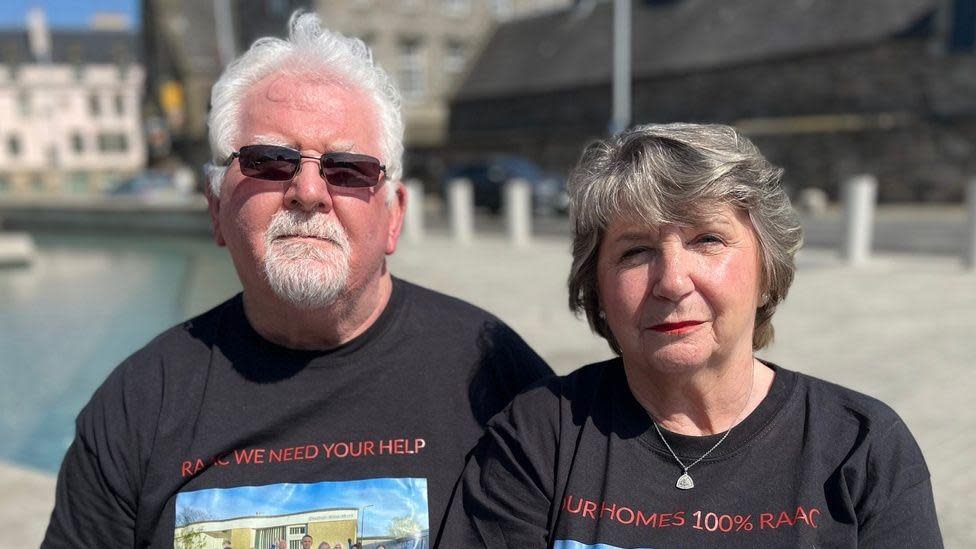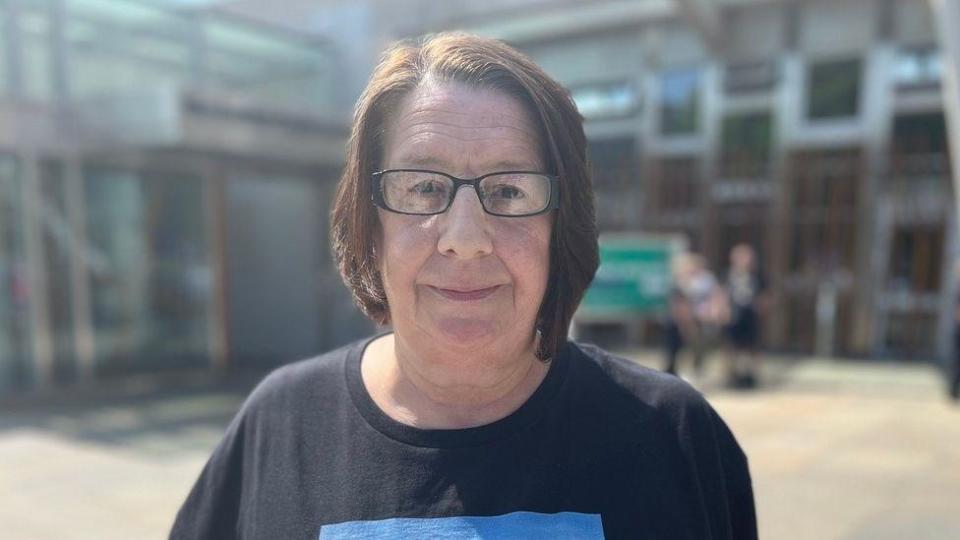'We live in fear our roof is going to collapse'

Homeowners affected by a cheap version of concrete have held a protest outside the Scottish parliament calling for compensation and a public inquiry.
Reinforced autoclaved aerated concrete (RAAC) was used mostly in flat roofing, but also in floors and walls, between the 1950s and 1990s.
It has also been found in public buildings sparking fears about the potential collapse of ceilings and walls.
As a result many local authorities are now moving to inspect council houses.
Current tenants are having their repair costs covered but many people who bought former council houses say they have no-one to turn to.
Ronnie and Rosalind Bell, both 76, discovered their house in Chestnut Grove, Livingston, West Lothian, contained RAAC in January - 16 years after they bought it.
Rosalind told BBC Scotland News: "You’re living in fear that the roof is going to collapse, or the sides are going to come in. You just don’t know."
The couple are calling for similarly affected homeowners to receive an alternative safe house or adequate compensation for their home.
Rosalind said: “They’re decanting all the council tenants and we’re going to be left with the houses boarded up, which could mean vandalism or vermin or damp coming through from next-door.
“Our house was built in 1961-63 and only had a 30-year lifespan. They should never have been sold at all.”
She added: “We’ve contacted the government and MPs and we get told it’s not their problem. We get told that we’re the homeowners, so it’s on us.
“We can’t get building insurance. Obviously we have home insurance but you wonder - are they going to pay out if the roof falls in?”
'Our home is worthless'
Ronnie said he was “disgusted” with the situation and the couple felt unsafe in their own home.
“We’ve bought in good faith what’s going to be our last home ever,” he said. “When we passed on, we were going to sell it and give it to the kids.
“But we can’t now because it’s worthless. We’ve paid off our mortgage - and for what?”
Rosalind added: “You really work hard and at the end of the day, nobody wants to help us. And we’re having to fight now.
“To put supports in for our house, you’re looking at about £50,000.
“Where are we going to get that? We’re 76-years-old, we don’t have that kind of money.”

Yvonne Middlemass bought her home in Chestnut Grove in 2017 after her husband retired.
“We would never have moved there if we had an inkling that anything was wrong,” she said. “We were never advised of anything, it wasn’t in any paperwork. So it was very recent.”
She joined the protest to push for the government to step in and help the homeowners facing huge bills to address RAAC in their house.
"We’re being advised to get our own structural engineers, but we don’t have the money for that," she said.
"So we’re left in limbo and we don’t know if the roof is going to come in.
"My husband is a pensioner and I don’t work due to ill health. What are we meant to do?”

Wilson Chowdhry, from the UK RAAC Campaign Group, is calling on the Scottish government to take responsibility for the RAAC in homes across the country and compensate home owners.
He said his daughter bought a house in Aberdeen only to discover within two months that RAAC had been dound in the roof.
Mr Chowdhry added: “We started the campaign and it grew into something nationwide when we discovered it affected many other homeowners across the UK.
“The only solution is to fund these homeowners, provide new roofs, or at least provide them with new homes.”
He added: “We want the government to initiate a public inquiry and look at how councils have dealt with RAAC since the beginning, how they’ve dealt with homeowners and the process they followed since they discovered it, as they’ve had early warnings since the 90s.”
The Scottish government has been approached for comment.

